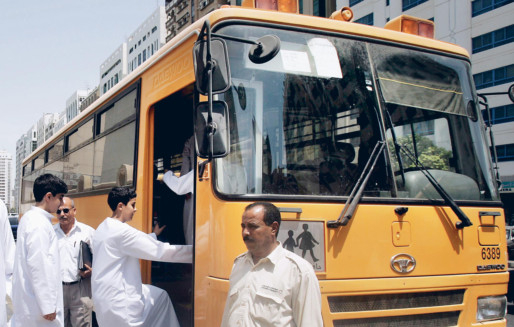
Abu Dhabi: School transport operators will not be allowed to increase bus fee without prior approval from ADEC (Abu Dhabi Education Council), government officials announced.
The move is aimed at stopping arbitrary increase of transportation fee by operators who have to abide by a set of whole new safety regulations in school buses by September.
“Bus operators or schools providing transportation to students should apply for bus free increases to ADEC. Fee hikes will be permitted only if their reasons are justified,” Yousuf Al Ghoul, specialist projects, school transportation planning and scheduling at Department of Transport (DoT) in Abu Dhabi said on Wednesday.
As per new regulations, school bus drivers must be above 25 years of age and should be able to speak English or Arabic. They should also have a good conduct certificate.
The new mandate requires that schools operate sufficient number of air conditioned buses. Boys and girls must sit in separate areas if they are taking the same bus. A supervisor should accompany students below 11 years and buses should not exceed the speed limit of 80km/h.
“Buses should be fitted with closed-circuit cameras, GPS and electronic attendance system among other specifications on seating, air conditioning, exterior aspects etc.”
“Bus operators have time till September to modify 50 per cent of their fleet and the rest should be accomplished by next September” said Ali Makki, stakeholder relationship manager at DoT.
New rules
Meanwhile,Christopher Gawronski, Transport Regulations Specialist at the Abu Dhabi Department of Transport, told XPRESS that schools in the capital will have to provide transport services for any student who wants it. “The provision of school transport services will no longer be an option. Every private school must provide services to students who want them. This is among a new set of requirements that schools must comply with.”
Speaking to XPRESS ahead of a workshop in Abu Dhabi on April 24 to apprise schools of the new requirements, Gawronski said a 2010 study of school transportation had led authorities to draw up a new regulatory framework for their operations.
“It will be binding on them to follow certain operating procedures and prescribed standards in terms of their fleet, staff and maintenance.”
He said the new rules are very clear about the credentials of bus drivers who must necessarily be experienced and trained with a one-year valid licence. All buses taking primary school students will have to get escorts on board to ensure the children’s safety.
Highlighting the issue at the International School Transport Conference 2013 in Dubai on April 22, he described how five government agencies in Abu Dhabi had come together to resolve the school transport bottlenecks in Falaj Hazza of Al Ain.
“There are 30-plus schools here with 35,000 students. The high concentration has resulted in heavy traffic delays and poor driving behaviour in the area.”
Having identified the problem, the authorities have been working on a series of steps, both in the short- and long-term, to resolve the issue. For instance, Gawronski said the Abu Dhabi Municipality has been working on a long-term plan to improve access to the area by introducing dedicated school bus roads, raised pedestrian crossings, improved parking standards and one-way service roads.
He said a moratorium on new schools in Falaj Hazza has also been introduced to prevent more schools from coming up in the area. The authorities are also looking at alternative sites to relocate existing schools.













